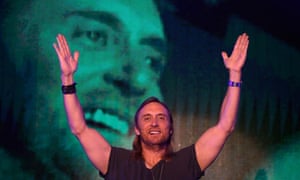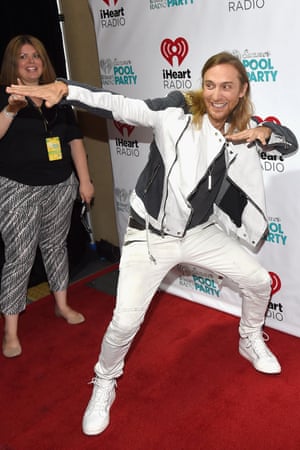David Guetta on going mainstream: 'Not only did I cross over, my entire scene did'
Posted by Simuka Rafeal
Once part of France’s dance music underground, Guetta is now one of the world’s top paid DJs – but he still enjoys the occasional moment of silence

It’s a Saturday night in Las Vegas and David Guetta is hours away from a performance at Caesars Palace, the crown jewel of the gambling capital, known for its stunning opulence and sheer massiveness. So what’s he doing to gear up? “Sitting quietly,” he says. “I close my eyes and try to stay super calm and super bored before going on stage, so then when I get on stage, it’s like ‘boom’. I’m completely hyper.”
With or without his quiet pre-show ritual, Guetta has plenty to be worked up about these days. Not only is he one of the highest paid DJs in the world (Forbes recently ranked him just behind Calvin Harris), he’s also currently enjoying the success of his latest single, Hey Mama, the tropical dance anthem that features Nicki Minaj, Bebe Rexha, and fellow EDM star Afrojack. It took Guetta more than a year to figure out how to turn it into the kind of ear worm he has reliably produced in the past. Odds are, if you’ve turned on the radio, been to a club, or ventured out into the outside world anytime in the past five years, you’ve heard one of his hits. It might have been his ubiquitous collaboration with Sia, Titanium; the emotional club anthem with Usher, Without You; or the unapologetically sexy track with Nicki Minaj, Turn Me On.
“When I released my album, DJs started playing Hey Mama and at the time it wasn’t even a single,” Guetta says of the moment he realized the track was starting to catch on, which was the culmination of months of tinkering with its structure. The bedrock of the song is a found 1940s prison recording from folk archivist Alan Lomax that songwriter Esther Dean first showed Guetta on YouTube.
“When Esther played me that sample, I was like: ‘Oh my God, I love this so much,’” he explains. “I fell so in love that I became obsessed with it and wanted it to be the chorus.” What Guetta soon realized was the sample worked as an opening to the track, supporting a different chorus he concocted. With that, all of the gears clicked into place and Guetta found himself with another hit. “Some radio stations wanted to play it when we were promoting other records,” he says of the instant reaction to the song. “We had to say, ‘No, please don’t play it yet!’ Which is kind of ironic.”

David Guetta strikes a pose at the iHeartRadio Summer Pool Party at Caesars Palace on May 30, 2015 in Las Vegas, Nevada. Photograph: Ethan Miller/Getty Images for iHeartMedia
Perhaps irony is a hidden theme of Guetta’s most recent output: Listen, his sixth studio album, which came out last November. After all, he was crafting a slew of happy-go-lucky dance tracks even in the midst of a divorce from his wife of 22 years, Cathy Lobé, a club manager, socialite and event planner.
“To be honest, it’s been hard,” he says of the break-up, which played out in the media where there were reports that Guetta lost half of his $30m fortune.
“A lot of the album is really emotional compared to my past work,” Guetta says. “I spent a lot more time on the lyrics. What’s interesting is, half of the album is very much influenced by what happened in my private life, and the rest is me coming back to my fundamentals.” Those fundamentals, built on the bedrock of songs about “people having a good time and happiness”, are why fans – from his 55 million Facebook friends to his 17.6 million Twitter followers – love Guetta, a fact he’s fully aware of. “Even though I love lots of different music, you can see the party-record part of the album is really exploding. People like me for a certain thing, I could say.”
That certain thing – the ubiquitous EDM club anthem – wasn’t always what he was known for. For years, while was a big name in the underground French music scene, it took him more than a decade to find mainstream success. A vital member of the “French Touch” scene (alongside the likes ofEtienne De Crecy, Laurent Garnier, and future superstars Daft Punk), Guetta released his first song, the now-retro Nation Rap, in 1990. (To give some idea of how long ago that was, his Hey Mama collaborator Afrojack was only three at the time.)
Almost 20 years passed before Guetta released what he considers his breakthrough single, I Gotta Feeling, the Grammy-winning song he produced for the Black Eyed Peas that held the number one spot in America for 14 weeks and still has the distinction of being the most downloaded song in the history of modern music.
“That changed everything,” he says of the feel-good track, which was performed everywhere from the Super Bowl to Oprah, and while some detractors pegged him as a sell-out (compared to an act like Daft Punk, which has retained underground crediblity, mostly), Guetta sees his mainstream success as a big moment not for himself, but for the scene in general. “I Gotta Feeling really changed the game and opened the doors for dance music in America,” he notes. “They started to play it for the first time on the radio, so not only did I cross over, but my entire scene crossed over. It was pretty exciting.”
A very young David Guetta
Hanging out backstage at Caesars Palace, Guetta is still focusing on being quiet before his appearance as part of the iHeartRadio Summer Pool Party, a shindig for the all-consuming parent company of dozens of radio and television stations across America. Also on the bill are the likes of Nick Jonas, Echosmith, and Chris Brown – three acts decades younger than Guetta himself (he turns 48 this November). So after seeing artists come and go for the past 20 years and presumably having his pick of the litter when it comes to collaborations, does Guetta have anyone he’d like to team up with whom he hasn’t worked with already?
“I actually started a record with Hozier that’s really exciting ,” he says of the Irish singer-songwriter. “I thought Take Me To Church was one of the best songs of last year, so we got together a long time ago to make a song and need to finish it. He’s really, really amazing.”
It’s continually searching for those crazy reactions that has kept Guetta relevant, whether it was during his French underground years, or amid his mainstream success. “What motivates me to continue to create music is that magic moment when I’m going to play one of my records for the first time onstage, or when a song becomes a hit and everyone is singing along to it,” he notes. “They are some of the strongest feelings I can get in my life.”
Guetta will perhaps experience those feelings tonight at Caesars Palace. But first, a little bit more silence.











0 comments